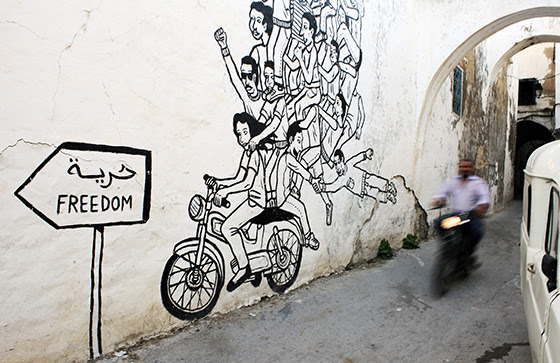An Arts Endeavor in Tunisia Brings Together Government and Civil Society
Tunisia emerged from the revolution with the potential to achieve true democratic change. But concerns linger over the future stability of the Tunisian state and the security issues that continue to threaten the country’s democratic transition.
While the Tunisian government has prioritized decentralization of state services, events like the terrorist attacks of last June often slow down the transition process. Positive momentum is maintained when civil society is able to hold the government accountable to its goals and promises.
To help ensure that civil society maintains its influence, our organization is partnering with Tunisia’s Ministry of Culture to revamp the country’s art scene. Recognizing the importance of art to social change, Al Mawred Al Thaqafy (Cultural Resource), a regional nonprofit that supports artistic creativity in the Arab world, has crafted a way to promote freedom of expression and creativity while working closely with the government.
Through an initiative called Tunisia Balad El Fann (Tunisia Country of Art), Al Mawred Al Thaqafy signed a memorandum of understanding with the Ministry of Culture, launching a joint effort to develop and decentralize the cultural sector in Tunisia in order to support the capacity-building process and make art activities more accessible to different audiences. Six training workshops, attended by independent cultural actors and government employees, are being held in cities across the country. At the end of the training, attendees will submit proposals for small cultural projects, four to six of which will be selected for funding of up to $10,000. When all is said and done, Tunisia Balad El Fann will have trained 120 cultural actors—ten of them in cultural management—and supported 30 projects across the country.
Before the revolution such a collaboration was unheard of. The regime, in control of many of the country’s cultural organizations, censored artists and smothered creativity. During the revolution, however, the arts flourished as unprecedented freedoms emerged. Art proved to be an effective platform to inspire and promote freedom of expression and innovation among long-stifled Tunisians. However, the fight for freedom of expression is not over. It remains an important struggle in Tunisia and the region.
This project proves that government and civil society don’t always have to be at odds. While Tunisia undergoes its democratic transition, officials have emphasized the decentralization of state resources. This goal aligns with ours, as our organization is trying to build the capacities of Tunisia’s cultural scene, especially in areas outside the capital.
In order to realize this goal, participants in the workshops share their diverse expertise in producing and managing artistic projects. By learning each other’s strengths and weaknesses, they develop a better sense of how they can collaborate. Together, Al Mawred and the Ministry of Culture are reaching largely disconnected areas of Tunisia while also promoting inclusion by fostering wider audiences and developing artistic talent from all corners of the country.
One of the selected projects from the first round of workshops, an art festival in the city of Birzete, is emblematic of this effort. A joint project between the independent and public sectors, the festival will benefit from both the creativity of the artists and the infrastructure and audiences of state-run cultural houses. It is our ambition that projects like these will build the capacity for more cultural projects and investment.
Al Mawred Al Thaqafy has been operating in the region for over ten years. While this is the first memorandum of understanding we have signed with a government, we hope it is not the last. Tunisia’s democratic progress makes it the perfect place to pilot our project. But ultimately, it is our ambition to take this initiative beyond Tunisia’s borders and implement it across the region. It isn’t just a blueprint for artistic endeavors, it is a framework for cooperation between a state and all stakeholders. To promote inclusion, government, and civil society, we will have to work from the same table.






